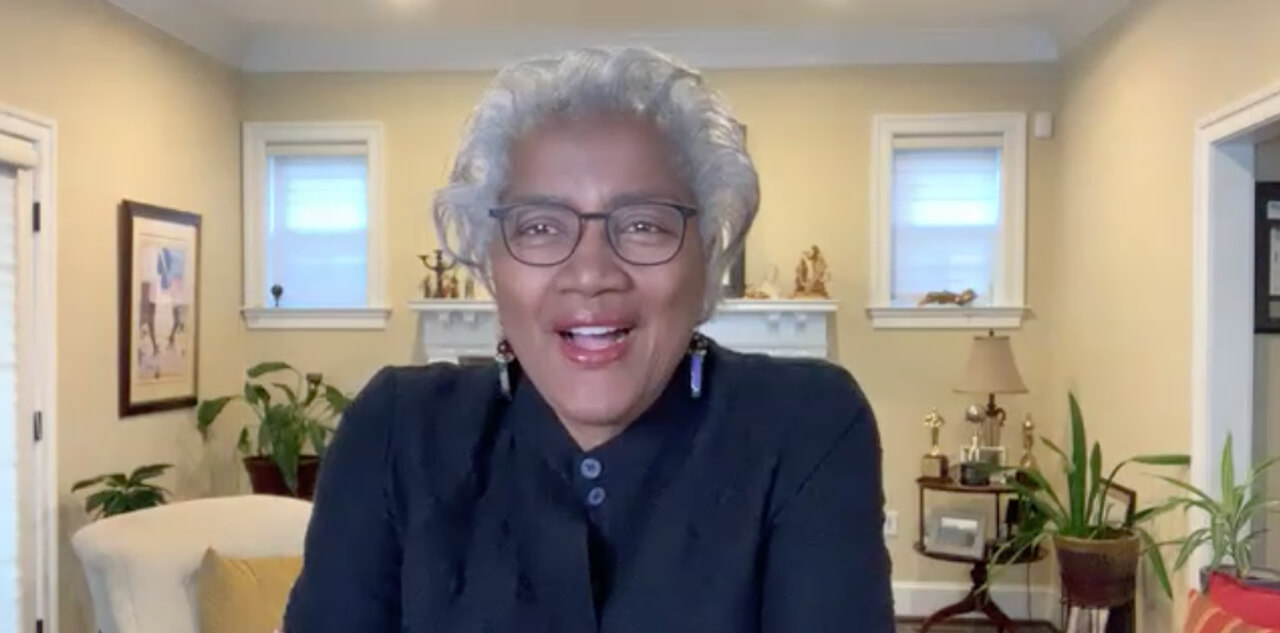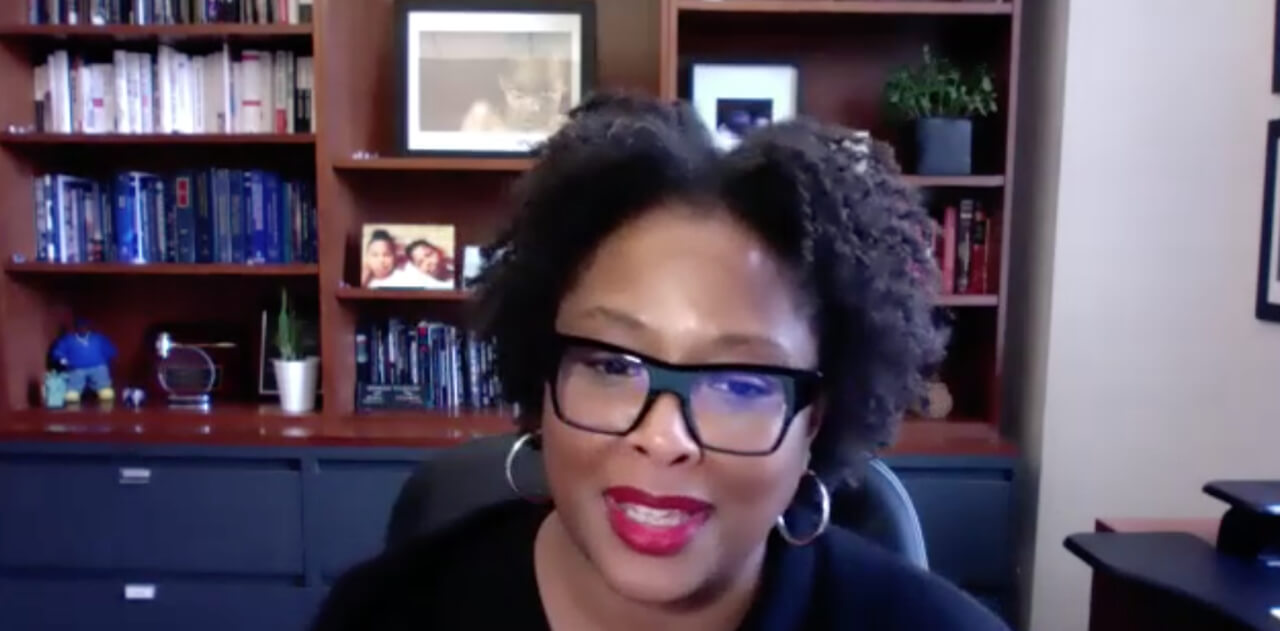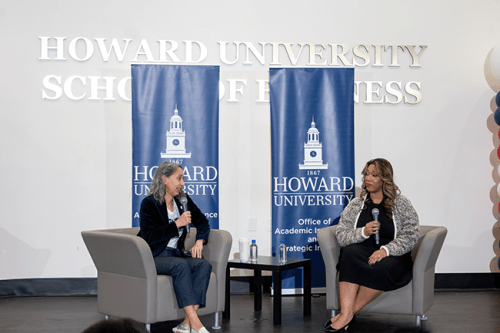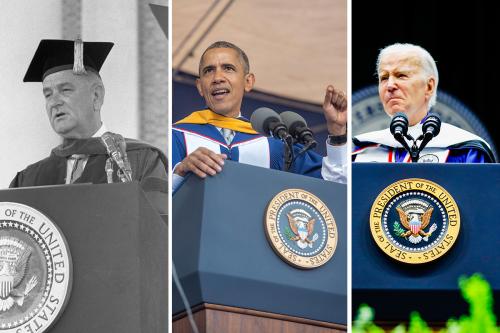 WASHINGTON – As chair of the Gwendolyn S. and Colbert I. King Endowed Chair in Public Policy Lecture Series, political strategist and author Donna Brazile has led the Howard University community through some of the nation’s most challenging events. Over the past two years, Brazile sat down with leading scholars, activists, lawmakers and political leaders, including Howard alumna and United States Vice President Kamala Harris, to discuss key issues concerning democracy, race, politics, the pandemic and more. Brazile closed out the 2020-2021 King Lecture Series in a timely conversation about racial justice and the law with guest Deborah N. Archer, national president of the American Civil Liberties Union (ACLU).
WASHINGTON – As chair of the Gwendolyn S. and Colbert I. King Endowed Chair in Public Policy Lecture Series, political strategist and author Donna Brazile has led the Howard University community through some of the nation’s most challenging events. Over the past two years, Brazile sat down with leading scholars, activists, lawmakers and political leaders, including Howard alumna and United States Vice President Kamala Harris, to discuss key issues concerning democracy, race, politics, the pandemic and more. Brazile closed out the 2020-2021 King Lecture Series in a timely conversation about racial justice and the law with guest Deborah N. Archer, national president of the American Civil Liberties Union (ACLU).
“The tragedies of the last year, COVID-19, and the police killings that seem to be relentless and happening every day, really brought to the fore for everyone to see the deep, embedded, compounded racial discrimination that is really woven into each and every system in our communities and in our lives,” said Archer.
Just days before Brazile and Archer came together for the discussion, a Minneapolis court found former Minneapolis Police officer Derek Chauvin guilty on all counts against him for the murder of George Floyd, whose name has been at the center of calls to address systemic racism and police violence against communities of color. For many, the guilty verdict was a bittersweet victory as the killings of Black and brown people by police across the country continue.
“After reading those verdicts on Tuesday, I breathed a little deeper,” said Archer. “I didn’t realize I was holding my breath for weeks and months with just the flood of bad news coming every day and anticipating the verdict. I certainly hope it brought some comfort. I had hope but not an expectation. We can never be confident or comfortable when it comes to addressing racial injustice. The history of racial injustice and atrocities in this country rarely leads to justice for the victims. It rarely leads to accountability. I would say it gave me hope that we are moving in a direction where we can start to really tackle these underlying systemic inequalities that plague our society.”
Archer highlighted the racialized roots of policing in the United States, noting the institution’s ties to slave patrols and the role of police in protecting power and privilege by exerting control over Black people.
“What we need now is transformation,” said Archer. “We have to renew our conviction to create a society where police don’t have the opportunity or the authority to use violence and harassment to target Black people, to kill Black people.”
Archer suggested reducing the footprint of police in communities – something that is already a reality in predominantly white communities who invest resources in youth and other populations to prevent the need for police. She also discussed the federal government’s role in police reform or what she called “policing the police.” On this topic, she discussed the end of qualified immunity and reinstating the U.S. Justice Department’s role in investigating and overseeing police conduct, which led to the development of consent decrees in major cities under the Obama administration. Another aspect to advancing structural changes through policymaking is eliminating barriers to voting.
 “The barriers and roadblocks to political participation that we have seen are incredibly dangerous. It’s a dangerous challenge for our democracy because it really reflects the desire of some to hold on to power completely and indefinitely, granting access to others only when it serves their purposes and in limited situations,” said Archer. “Since the founding of our democracy, Black voters and voters of color have had to overcome relentless efforts to block us from casting our ballot. The intimidation against Black voters is growing stronger and was more rampant and widespread during this past election than in any recent election. Now everything that enabled Black people and other people of color to vote in record numbers during this last election are under attack.”
“The barriers and roadblocks to political participation that we have seen are incredibly dangerous. It’s a dangerous challenge for our democracy because it really reflects the desire of some to hold on to power completely and indefinitely, granting access to others only when it serves their purposes and in limited situations,” said Archer. “Since the founding of our democracy, Black voters and voters of color have had to overcome relentless efforts to block us from casting our ballot. The intimidation against Black voters is growing stronger and was more rampant and widespread during this past election than in any recent election. Now everything that enabled Black people and other people of color to vote in record numbers during this last election are under attack.”
Brazile has brought her expertise, ideas and network of exceptional leaders to the Howard University community throughout her tenure as chair of the King Lecture Series during a critical time in the nation’s history. Howard University President Wayne A. I. Frederick, M.D., MBA, acknowledged Brazile for her service and leadership during this culminating conversation.
“We could not have selected anyone better to lead us during this transformational time in our nation,” said President Frederick. “I certainly want to thank you because you now are a daughter of Howard University in more ways than one. I look forward to continuing our association with you. Thank you for your exceptional work, and for embracing the Howard family and bringing so much to us.”
“I want to thank Gwen and Colbert King for this great honor of serving as the chair of their lecture series for the past three years,” said Brazile. “I’ve had the opportunity to not only bring so many wonderful, remarkable, insightful people to campus, but to meet some of the best young activists and leaders in the world. This has been a great honor.”
###
About Howard University
Founded in 1867, Howard University is a private, research university that is comprised of 13 schools and colleges. Students pursue more than 140 programs of study leading to undergraduate, graduate and professional degrees. The University operates with a commitment to Excellence in Truth and Service and has produced one Schwarzman Scholar, three Marshall Scholars, four Rhodes Scholars, 12 Truman Scholars, 25 Pickering Fellows and more than 165 Fulbright recipients. Howard also produces more on-campus African-American Ph.D. recipients than any other university in the United States. For more information on Howard University, visit www.howard.edu.
Media Contact: Misha Cornelius, misha.cornelius@howard.edu




